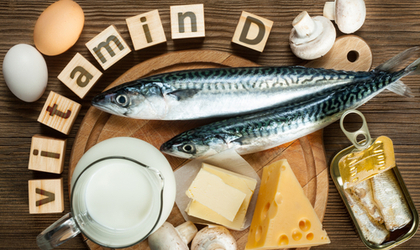
Derived from the German word ‘koagulation’, Vitamin K is a fat-soluble vitamin that plays a critically important role in various aspects of health, some of which are still being discovered by scientists. Most notably, vitamin K is involved in blood clotting, bone metabolism, and regulating blood calcium levels.
Vitamin K exists naturally as vitamin K1 and vitamin K2. You can find vitamin K1 primarily in green leafy vegetables, as well as soybean oil and olive oil. Smaller amounts of vitamin K2 can be found in butter, chicken, cheese, egg yolks, and fermented soybeans, also known as Japanese natto.
Here, we uncover all there is to know about vitamin K, from its function in the body to what to look for in a vitamin K supplement.
Health Benefits of Vitamin K
Bone Health
Vitamin K works with other nutrients to support bone metabolism. Crucially, vitamin K drives calcium into the bones to help them develop properly. Indeed, vitamin K has demonstrated promise in maintaining bone mineral density and decreasing the risk of fractures (1).
A study conducted by the Brigham and Women’s Hospital and Harvard Medical School reported that women who consume enough vitamin K in their diet are less likely to break a hip (2). Further empirical data purports that low levels of vitamin K can result in low bone mineral density and increase incidents of hip fractures in women (3).
Low bone mineral density can lead to conditions like osteoporosis, in which bones become brittle, fragile, and eventually break. It’s worth noting that women are more predisposed to bone fractures after menopause when the bone-protective hormone, oestrogen, drops sharply.
Heart Health
Besides supporting bone health, vitamin K also prevents the build-up of calcium in the arteries around your heart, thereby helping to maintain normal heart health (4). Vitamin K also supports the production of proteins that control blood clotting. A blood clot can cause heart attacks, strokes, and other life-threatening conditions.
In one large-scale study conducted on women, researchers found those with the greatest intake of vitamin K2 had a lower risk of heart disease (5). The findings revealed the heart disease risk was reduced by 9% for every 10µg of vitamin K2 consumed daily.
Another report highlighted that participants with the highest consumption of vitamin K2 were 52 per cent less likely to suffer from artery calcification, which can ultimately compromise heart health (6).
How Much Vitamin K Do I Need?
As a general rule, adults require approximately 1μg of vitamin K2 for every kilogram of weight each day (8). So, if you weigh 75kg, you will need 75μg of vitamin K2. Official guidelines, however, recommend 90μg daily for women and 120μg for men. In most of our vitamin K supplements, you’ll find 75-90μg.
What is the difference between vitamin K1 and vitamin K2?
Vitamin K1 is the predominant form of vitamin K present in the diet, mainly present in leafy green vegetables. Whereas vitamin K2 is synthesised by bacteria and is mainly found in fermented foods. Although they share a name, vitamin K1 and K2 do not share the same structure. Consequently, they have different absorption rates and bioavailability. Despite this distinction, they serve the same role in blood coagulation, and are required for optimal body function.
Both vitamin K1 and K2 are essential for bone health. However, recent evidence into vitamin K2, in the form of MK-7, has also been shown to be an active component in supporting cardiovascular health (7).
Sources of Vitamin K
As previously mentioned, vitamin K1 and K2 have different chemical structures. According to a recent analysis, the body absorbs ten times more vitamin K2 (in the form of MK-7) than vitamin K1 (9). However, since vitamin K is fat-soluble, eating dietary fats (plant oils or butter) may support the absorption of vitamin K1 from plants.
Dietary Sources of Vitamin K1
Dark leafy green vegetables, like spinach, kale, turnip greens, and collard greens, are the richest sources of vitamin K1. Other sources include:
-
Blueberries
-
Grapes
-
Carrots
-
Vegetable oils, such as olive oil and soybean oil
Dietary Sources of Vitamin K2
Dairy products, in particular, some cheeses – Edam, Gouda, Jarlsberg, Cheddar, and Stilton – natto (a fermented Japanese food made from soybeans), eggs and meat are the best sources of vitamin K2. Other sources include:
-
Oily fish, like salmon
-
Sauerkraut
Which Is The Best Form of Vitamin K Supplement?
Single Supplements
To maximise your vitamin K intake, you may consider taking a single supplement that delivers at least 90μg. When choosing a product, always look for vitamin K2 in the form of MK-7. Our vitamin K2 formula is derived from chickpea protein and uses a unique extraction process, providing a product that’s more than 96% pure, natural, full-spectrum MK-7. The MK-7 we use in our supplements is a patented form known to support both bones and cardiovascular health.
Bone Health Multivitamin
A multivitamin specially formulated for bone health is another great option. Besides packing high levels of vitamin K, this product will also supply plenty of calcium, vitamin D3, and magnesium to support overall bone health. Our OsteoGuard® products – OsteoGuard® Orginal and OsteoGuard® Ultra – deliver impressive amounts of vitamin K2, at 75μg and 90μg, respectively.
Multivitamin
Providing a comprehensive spread of vitamins and minerals, taking a quality multivitamin is an excellent insurance policy for your health. Our Nutrition Advisors recommend Multi-Max Complete® as it supplies good levels of vitamin K, vitamin D and calcium to support bone health, plus vitamin B1 for the normal function of the heart.
It should be noted, however, that vitamin K interacts dangerously with certain medications, namely blood thinners, like warfarin. If you take this prescription medication, always consult your doctor before supplementing with vitamin K.
If you want to learn more about supplementation and supporting your overall health and wellbeing, please visit the rest of our blog.
References:
-
Pearson D. Bone Health and Osteoporosis: The Role of Vitamin K and Potential Antagonism by Anticoagulants. Nutrition in Clinical Practice. 2007;22(5):517-544.
-
Feskanich D. et al., Vitamin K intake and hip fractures in women: a prospective study. The American Journal of Clinical Nutrition. 1999;69(1): 512-516.
-
Booth SL. et al., Vitamin K intake and bone mineral density in women and men. Am J Clin Nutr. 2003;77(2):512-516.
-
Theuwissen. E, Smit. E, Vermeer. C. The role of vitamin K in soft-tissue calcification. Adv Nutr. 2012;3(2):166-173.
-
Gast GC. et al., A high menaquinone intake reduces the incidence of coronary heart disease. Nutr Metab Cardiovasc Dis. 2009;19(7):504-510.
-
Gelejinse JM. et al., Dietary intake of menaquinone is associated with a reduced risk of coronary heart disease: the Rotterdam Study. J Nutr. 2004;134(11):3100-3105.
-
nhs.uk. (2020). Vitamins and minerals - Vitamin K. Available online: https://www.nhs.uk/conditions/vitamins-and-minerals/vitamin-k
-
National Library Of Medicine - National Centre of Biotechnology Information - PubMed Central. 2019. Vitamin K: Double Bonds beyond Coagulation Insights into Differences between Vitamin K1 and K2 in Health and Disease.. Available online: https://www.ncbi.nlm.nih.gov/pmc/articles/PMC6413124/#:~:text=Vitamin%20K1%20is%20the%20predominant,process%20%5B5%2C9%5D
-
Halder M. et al., Vitamin K: Double Bonds beyond Coagulation Insights into Differences between Vitamin K1 and K2 in Health and Disease. International journal of molecular sciences. 2019;20(4):896.
Related Posts
Disclaimer: The information presented by Nature's Best is for informational purposes only. It is based on scientific studies (human, animal, or in vitro), clinical experience, or traditional usage as cited in each article. The results reported may not necessarily occur in all individuals. Self-treatment is not recommended for life-threatening conditions that require medical treatment under a doctor's care. For many of the conditions discussed, treatment with prescription or over the counter medication is also available. Consult your doctor, practitioner, and/or pharmacist for any health problem and before using any supplements or before making any changes in prescribed medications.

Keri
Keri Filtness has worked in the Nutrition Industry for 19 years. She is regularly called upon for her professional comments on health and nutrition related news. Her opinions have been featured by BBC3, Prima, Vitality, The Mirror, Woman’s Own and Cycling Weekly, amongst others. She has also worked one to one with journalists, analysing their diets and health concerns and recommending changes and additions, where appropriate.
View More



